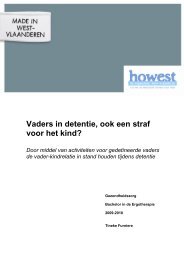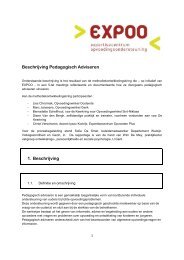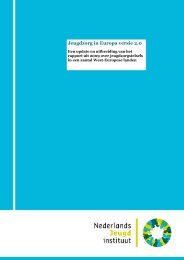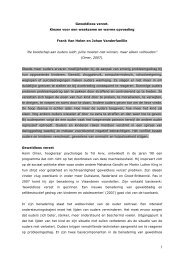McDonald, L., FitzRoy, S., Fuchs, I., Fooken, I. & Klasen, H. (2012). Strategies for highretention rates of low-income families in FAST (Families and schools together): Anevidence-based parenting programme in the USA, UK, Holland and Germany.European Journal of Developmental Psychology, 9(1), 75–88McPherson, M., Smith-Lovin, L. & Brashears, M.E. (2006). Social isolation in America:Changes in core discussion networks over two decades. American Sociological Review,71(3).McKelvey, L.M., Fitzgerald, H.E., Schiffman, R.F. & Von Eye, A. (2002). Family stress andparent–infant interaction: The mediating role of coping. Infant Mental Health Journal,23(1-2), 164–181.Mihalic. S., Fagan, M., Irwin, K., Ballard, D. & Elliot, D. (2002). Blueprints for violenceprevention replications: Factors for implementation success. Boulder: Centre for Study andPrevention of Violence, University of Colorado.Miller, L.M., Southan-Gerow M.A. & Allin, R.B. Jnr. (2008). Who stays in treatment? Childand family predictors of youth client retention in a public mental health agency. ChildYouth Care Forum, 37, 153–170.Miller, S. & Sambell, K. (2003). What do parents feel they need? Implications of parents’perspectives for the facilitation of parenting programmes. Children & <strong>Society</strong>, 17(1),32–44.Murry, V.M. & Brody, G.H. (2007). Partnering with community stakeholders: engagingrural African America families in basic research and the Strong African AmericanFamilies preventive intervention program. Journal of Marital and Family Therapy, 3,271–285.Nix, R.L., Bierman, K.L., McMahon, R.J. & The Conduct Problems Prevention ResearchGroup (CPPR) (2009). How attendance and quality of participation affect treatmentresponse to parent management training. Journal of Consulting & Clinical Psychology,77 3), 429–438.Orrell-Valente, J.K., Pinderhughes, E.E., Valente, E., Laird, R.D. & The Conduct ProblemsPrevention Research Group (1999). If it’s offered, will they come? Influences onparents’ participation in a community-based conduct problems prevention program.American Journal of Community Psychology, 27(6), 753–783.Patel, A., Calam, R. & Latham, A. (2011). Intention to attend parenting programmes: doesethnicity make a difference? Journal of Children’s Services, 6(1), 45–58.Patterson, G.R. & Forgatch, M.S. (1995). Predicting future clinical adjustment fromtreatment outcome and process variables. Special issue: Methodological issues inpsychological assessment research. <strong>Psychological</strong> Assessment, 7, 275–285.Pearson, C. & Thurston, M. (2006). Understanding mothers’ engagement with antenatalparent education services: a critical analysis of a local Sure Start service. Children &<strong>Society</strong>, 20, 348–359.Pettigrew, T. F. (1998). Intergroup contact theory. Annual Review of Psychology, 49, 65–85.80 Professional Practice Board
Putnam, R. (1999). Bowling alone: The disappearance of civic America. Cambridge, MA:Harvard University Press.Repper, J. & Carter, T. (2012). A review of the literature on peer support in mental healthservices. Journal of Mental Health, 20(4), 392–411.Rooke, O., Thompson, M. & Day, C. (2004). School-Based Open Access ParentingProgrammes: Factors Relating to Uptake. Child and Adolescent Mental Health, 9 (3),130–138.Sanders, M.R., Prior, J. & Ralph, A. (2009). An evaluation of a brief universal seminar serieson positive parenting: A feasibility study. Journal of Children’s Services, 4(1), 4–20.Sandler, J. (2007). Community based practices: integrating dissemination theory withcritical theory of power and justice. American Journal of Community Psychology, 4,272–289.Scott, S. (1998). Fortnightly review: aggressive behaviour in childhood. <strong>British</strong> MedicalJournal, 316, 202.Scott, S., Knapp, M., Henderson, J. & Maughan, B. (2001). Financial cost of socialexclusion: follow up study of antisocial children into adulthood. <strong>British</strong> MedicalJournal, 323, 191–194.Sheldon, B. & Macdonald, G. (2009). A textbook of social work. London: Routledge.Social Research Unit (2012a). Investing in children: Youth Justice 1.1. Retrieved fromhttp://www.dartington.org.uk/investinginchildren. Dartington: Social Research Unit.Social Research Unit (2012b). Investing in children: Education and early years 1.1.Retrieved from http://www.dartington.org.uk/investinginchildren. Dartington:Social Research Unit.Shortt, A.L., Hutchinson, D.M., Chapman, R., Toumbourou, J.W. (2007). Family, school,peer and individual influences on early adolescent alcohol use: First year impact ofthe Resilient Families program. Drug and Alcohol Review, 26(6), 625–634.Spoth, R. & Redmond, C. (1995). Parent motivation to enrol in parenting skills programs:A model of family context and health belief predictors. Journal of Family Psychology,9(3), 294–310.Spoth, R. & Redmond, C. (2002). Project Family prevention trials based incommunity–university partnerships: Toward scaled-up preventive interventions.Prevention Science, 3(3), 203–221.Spoth, R., Clair, S., Greenberg, M., Redmond, C. & Shin, C. (2007). Toward disseminationof evidence-based family interventions: Maintenance of community-based partnershiprecruitment results and associated factors. Journal of Family Psychology, 21(2), 137–146.Spoth, R., Goldberg, C. & Redmond, C. (1999). Engaging families in longitudinalpreventive interventions research: Discrete-time survival analysis of socioeconomicand social-emotional risk factors. Journal of Consulting & Clinical Psychology, 67(1),157–163.Spoth, R., Redmond, C. & Shin, C.Y. (2000). Modelling factors influencing enrolment infamily-focused preventive intervention research. Prevention Science, 1(4), 213–225.<strong>Technique</strong> <strong>Is</strong> <strong>Not</strong> <strong>Enough</strong> 81
- Page 1 and 2:
Professional Practice BoardTechniqu
- Page 3:
ContentsAcknowledgements ..........
- Page 6 and 7:
We also wish to thank Sarah Fitzroy
- Page 8 and 9:
alienation and sense of isolation f
- Page 10 and 11:
A range of these programmes are rec
- Page 12 and 13:
2. Vision and purpose2.1. The brief
- Page 14 and 15:
From this conference a commitment t
- Page 16 and 17:
development strategies have been us
- Page 18 and 19:
3. The socio-political context3.1.
- Page 20 and 21:
Box 1: UNODC compilation of evidenc
- Page 22 and 23:
cost-effective and it has caused so
- Page 24 and 25:
Positive ActionPositive Action was
- Page 26 and 27:
■Programmes must have robust evid
- Page 28 and 29:
These principles are based on our a
- Page 30 and 31:
families who might benefit. This pr
- Page 32 and 33: providers and partner agencies were
- Page 34 and 35: Positive Parenting Programme (Tripl
- Page 36 and 37: multiple approaches that also inclu
- Page 38 and 39: need to learn English in their pare
- Page 40 and 41: Parenting programmes that work in m
- Page 42 and 43: 5. Principle 2. Cultural sensitivit
- Page 44 and 45: Positive ActionPositive Action faci
- Page 46 and 47: attitudes. Such attitudes can surfa
- Page 48 and 49: developed purely from a theory-driv
- Page 50 and 51: cultural heritages lecture at them.
- Page 52 and 53: having reciprocal relationships to
- Page 54 and 55: first started delivering the progra
- Page 56 and 57: Strengthening Families ProgramWhen
- Page 58 and 59: 7. Principle 4. Sustainability: Cre
- Page 60 and 61: operate at different levels. Some a
- Page 62 and 63: Incredible YearsAnother component o
- Page 64 and 65: commissioners can have more confide
- Page 66 and 67: Incentives for achieving model fide
- Page 68 and 69: 8. A framework for ensuring that ev
- Page 70 and 71: 9. Next stepsEvidence-based parenti
- Page 72 and 73: 70 Professional Practice Board
- Page 74 and 75: 72 Professional Practice Board
- Page 76 and 77: ReferencesAlinsky, S.D. (1971). Rul
- Page 78 and 79: Davidson, G. & Campbell, J. (2007).
- Page 80 and 81: Heindrichs, N., Bertram, H., Kusche
- Page 84 and 85: Spoth, R., Redmond, C., Hockaday, C
- Page 86: The British Psychological SocietySt
















